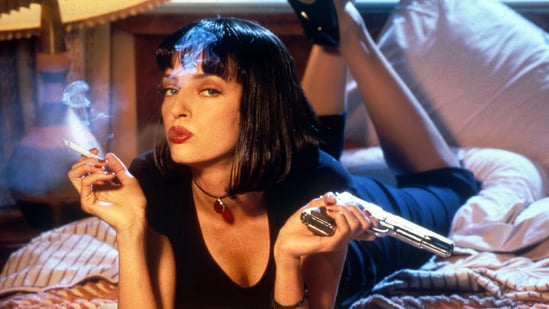Pulp Fiction: A Kaleidoscope of Chaos and Redemption
Cinemapedia
Quentin Tarantino’s Pulp Fiction is a cinematic tour de force that redefined storytelling in modern cinema. Released in 1994, the film’s nonlinear narrative, razor-sharp dialogue, and unforgettable characters have cemented its status as a cultural phenomenon. With an ensemble cast featuring John Travolta, Uma Thurman, Samuel L. Jackson, and Bruce Willis, Pulp Fiction is an audacious exploration of morality, chance, and the messy beauty of human existence.
A Tangled Web of Lives
The film’s narrative unfolds in a series of interconnected vignettes that follow hitmen Vincent Vega (John Travolta) and Jules Winnfield (Samuel L. Jackson), mob wife Mia Wallace (Uma Thurman), boxer Butch Coolidge (Bruce Willis), and a host of other colorful characters. From a drug overdose to a botched robbery, Pulp Fiction masterfully weaves these disparate stories into a cohesive tapestry of dark humor, tension, and unexpected poignancy.
Tarantino’s nonlinear structure challenges traditional storytelling conventions, creating a sense of unpredictability that keeps viewers engaged. The film’s episodic nature allows for moments of intense drama and absurd comedy, often within the same scene, showcasing Tarantino’s unparalleled ability to balance tone.
A Stylish Ode to Pulp Culture
Visually, Pulp Fiction is a vibrant homage to the pulp magazines and noir films that inspired it. Cinematographer Andrzej Sekula captures the film’s eclectic world with a mix of bold colors, striking compositions, and deliberate framing. The iconic scenes—from the adrenaline shot sequence to the dance contest at Jack Rabbit Slim’s—are imbued with a timeless quality that continues to resonate with audiences.
Tarantino’s attention to detail extends to the costumes, set design, and props, creating a visually immersive experience that feels both grounded and larger-than-life. The film’s aesthetic is as much a character as the people inhabiting its world.
A Mixtape of Nostalgia and Attitude
The soundtrack of Pulp Fiction is an essential part of its identity, featuring an eclectic mix of surf rock, soul, and classic rock ‘n’ roll. Tracks like Dick Dale’s "Misirlou" and Chuck Berry’s "You Never Can Tell" punctuate key moments, enhancing the film’s energy and emotional impact.
Tarantino’s use of music as a storytelling device is masterful, with each song feeling perfectly matched to its scene. The soundtrack not only complements the film’s tone but also stands on its own as a cultural artifact.
Redemption, Consequences, and the Human Condition
At its core, Pulp Fiction is a meditation on redemption and the choices that define us. Jules’s transformation from a cold-blooded killer to a man seeking a "higher path" provides a moral anchor for the film, contrasting sharply with Vincent’s tragic trajectory. Butch’s decision to save his nemesis, Marsellus Wallace (Ving Rhames), underscores the film’s exploration of honor and humanity in the face of violence.
Tarantino’s dialogue, filled with philosophical musings and pop culture references, adds depth to the characters, making their struggles feel universal despite the film’s heightened reality. The film’s ability to find moments of grace amidst chaos is a testament to its enduring power.
A Cinematic Masterpiece
Pulp Fiction is a groundbreaking work that combines style, substance, and innovation to create an unforgettable cinematic experience. Its influence can be seen in countless films and television shows, but none have replicated its unique blend of humor, tension, and heart.
With its unforgettable characters, iconic dialogue, and masterful storytelling, Pulp Fiction remains a touchstone of modern cinema. It is a film that challenges, entertains, and lingers in the mind long after the credits roll, reminding us of the messy, unpredictable, and beautiful nature of life.


